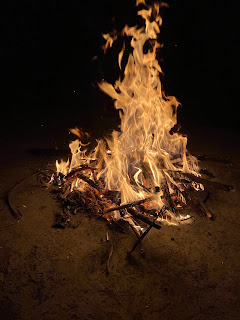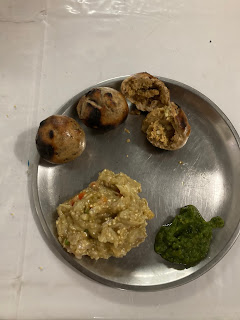Litti Chokha and A Revenge Christmas Party
The “litti” is a ball of wheat dough filled with “Sattu” which is basically the flour of roast gram seed. This stuffed dough-ball is cooked over slow fire of wood charcoal or cow-dung cake(colloquially called "Goitha"), which gives an earthy flavour and a unique taste. Together with the humble brinjal “Chokha”, it is an integral part of cuisine of Bihar and West UP. For people coming from these parts of the world, there is nothing as delicious as the “litti-chokha”, and a call for “Litti party” is likely to elicit a stronger emotion than an invitation from the White House.
My
wife informed me that they would be celebrating Christmas this year by having a
“litti” party at home. My sister-in-law and her husband were designated the
main cooks as well as the hosts for the evening. I, being physically separated
from my wife due to an ongoing pandemic which caught us in geographically
different parts of the country, was not going to be a part of the celebrations.
Let
me be clear, I like “litti”, but I do not consider it to be one of the things to
die for. However, I make an exception for the “litti” cooked at my
sister-in-law’s place. Her husband is a pathetic cook, but he makes delicious
“litti” which is truly fit for the Gods. The very prospect of a “litti”
party at his house is enough for the anticipatory activation of the gastric and
other digestive juices. So, I was obviously pretty miffed at the non-inclusion.
There
was only one way out – I planned a revenge party of my own. On the anniversary
of the day on which the Magi culminated their long journey and brought magical gifts, I dug into my kitchen store and
came out victoriously with all the magic ingredients. As luck would have it, I
even found some brinjal. My preparation was complete.
But I
did not have the technical expertise to roast the brinjal for making “chokha”. I had assisted my mother in this task a few decades ago, but since my
marriage this task has been done perfectly by my wife, who not only did not require
my assistance, she actually spurned it and I have frequently been kicked out of
the kitchen for asking too many questions and making too many suggestions. Just
as I was struggling to come up with an acceptable plan of action, my maid came to my rescue
and took over. I asked her to roast the brinjal over the gas stove and mash it.
I intended to take complete care of garnishing it.
All through our various transfer pastings, my
wife tries to teach the maids about her favourite cuisine wherever
she goes. My present maid had resultantly perfected the art of preparation of
the “sattu” for the “litti”, and all I had to do was to ask her to prepare the
dough and leave. Being the methodical person I am, I asked her to complete
these preparatory tasks by noon, and then set on to prepare the bonfire which
would be lit a couple of hours after the sun set. Having accomplished the
desired targets, I went to bed for my siesta.
By
evening, I had already informed a few of my friends about my intention of
having a bonfire and plans to make some “litti-chokha” in the evening, and they
were eagerly waiting for the delicious outcome of my successful endeavors.
Come
evening, I called up my wife just as she was leaving for her sister’s place. We
did not talk for long, and I got after the promise of the mouth – watering
blessing from the fire god. I took out the mashed brinjal, and realized I did
not know what to do with it.
When
the going gets tough, great men do not shy away from taking tough decisions. I
immediately decided that it was time to ask for some expert advice, and called
up my wife. The phone was answered by my elder daughter, who asked what I was
doing. I told her to hand the phone over to her mother, and was curtly informed
that she was preparing the dough and could not hold the phone.
The
time had come for another tough call. I swallowed my pride and asked my
daughter to ask her mother about the garnishing required for “chokha”, and
received full instructions passed second hand while the entire family was in
attendance. Notwithstanding the mirth that ensued, I succeeded in deciphering
the language sufficiently to make a palatable mix.
Next
came the filling of the dough. Here, I worked like a professional and had
somewhat round balls filled with “sattu” ready in around thrice the time that
my wife would have taken. I would have patted my back over the accomplishment,
but my hands were dirty.
Earlier
in the day, I had piled some wood, and all I had to do now was to light the
fire. Surprisingly, I succeeded in doing so without singeing myself. A glorious
fire was set before me, and I collected photographic evidence of my accomplishment
before settling in front of the welcome fire.
Over
the next few minutes, the fire died down, leaving the cinders I desired. I
promptly put the dough-balls in fire and covered them with a mixture of hot
cinders and ashes. I remembered that one has to occasionally turn the shapely objects for even cooking,
which I did as well as I could. This was when I singed myself. But then, what
is bravery without scars.
It
was a very quiet night. I could not hear any cricket or monkeys, though I am
sure that some of them would be watching from the nearby mango or litchi trees.
I gently hummed as I went inside to cover myself in a jacket and get some water
to drink.
When
I came out, the cinders had converted to ash. I looked for the “litti”, and
realized that they had undergone the same fate. Without losing my breath or my head, I took it out, put it in a
plate, and photographed it. Next, I called up all my friends who had been
assured of a heavenly treat that the trip to heaven had suffered a roadblock,
and that they should not hold their breaths while they waited. They took this
information sportingly, and I even got an invitation from one of them to join
the family at his house. The lady was really insistent, but I had my pride. I
had decided that I would have “litti-chokha” for dinner, and so it was going to be.
As I
lay dejected, I recalled something that my cousin had shared with me a long
time ago when he had prepared the same dish in the field at my village. He had
ruled that the initial impression of every good “litti” was always a seemingly burnt look. One should scrub it with a towel and polish it
with some “ghee” or butter to turn it into the beauty that it should look like.
I
hunted out a fresh towel, and went on to scrub the charred ball of dough as
though my life depended on it. Within half a minute, I was rewarded with the
fresh look of the delicacy which was worthy of being called a “litti”. I
renewed my effort with excitement over the remaining ones, and was duly
rewarded. I then polished the stuff with some butter. It looked heavenly.
I set
the entire stuff on a plate, and arranged the accompaniments.
And
then I performed the most important activity. I photographed it, and sent the
pictures on the social media for the world to see and appreciate. Within a few
minutes, I was rewarded with appreciative comments and words smacking of envy,
jealousy, and even desire for tasting this manna from heaven.
As
far as the taste of the food is concerned – well, that is a story for another
day.







Comments
Post a Comment